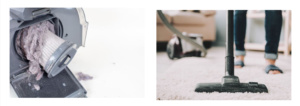
By Denise Mann , Jan.6, 2012
You vacuum your house religiously to get rid of all the dust, dirt, and bacteria and make sure your indoor air is up to snuff. But new research suggests that some vacuum cleaners may actually be making things worse, not better.
Certain vacuum cleaners spit fine dust and bacteria back into the air, where they can spread infections and trigger allergies.
Australian researchers tested 21 vacuum cleaners from 11 manufacturers, including two commercial models. The vacuums were six months to 22 years old, and ranged from less than $100 to almost $800. Brands included Dyson, Electrolux, Hoover, iRobot, and Sanyo. The researchers measured 62 different air emissions.
All released some bacteria, dust, and allergens back into the air. Newer and more expensive vacuum cleaners generally caused less indoor air pollution than older, cheaper models, the study showed.
Vacuums with high-efficiency particulate air (HEPA) filters released only slightly lower levels of dust and bacteria than vacuums that did not use these special filters. HEPA filters are supposed to remove 99.9% of the pollen, animal dander, and even bacteria from the air.
“Both vacuum cleaning and the act of vacuuming can release and re-suspend dust and allergens, leading to increased exposure,” write study researchers from Queensland University of Technology in Brisbane, Australia.
But don’t go throwing your trusty vacuum cleaner out so quickly, says Viviana Temino, MD. She is an assistant professor of allergy and immunology at the University of Miami School of Medicine.
“For a vacuum to do more harm than good, it has to be a really old vacuum cleaner that has never been cleaned,” she says. “In general, most vacuums do take up more dust, dirt, and allergens than they release.”
HEPA filters are still the way to go, she says: “They remove more particles than they release back.”
There are other things you can do to keep your indoor air clean. “If you or someone in your home does have indoor allergies, get rid of your carpet,” she says. “If you have throw rugs, wash them once a week in really hot water. This will kill off dust mites and other allergens.”
Feather dusters just relocate dust around the room. Instead, try a microfiber or electrostatic cloth. These don’t stir up dust, she says.
Jeffrey May says HEPA filters are still the best. He is the principal scientist at May Indoor Air Investigations in Tyngsborough, Mass., and author of several books, including My House Is Killing Me! The Home Guide for Families With Allergies and Asthma. “A junky old vacuum cleaner will definitely release more allergens than a newer one,” he says.
His advice? Get a vacuum cleaner that has a HEPA filter, and change the filter and clean your house regularly. “Make sure to vacuum under furniture and behind furniture,” May says. “You can’t believe the stuff that accumulates there, and this can be an enormous source of allergens.”
David Corry, MD, is not a fan of the vacuum cleaner. Corry is a professor and chief of the section of immunology, allergy, and rheumatology in the department of medicine at Baylor College of Medicine in Houston, Texas.
He says that the only kind of vacuum that makes sense is a central unit. With these, the motor and filtration unit are located outside of the house, so all of the dust is also filtered outward.
“Standard vacuums all will emit dust of some kind, but it is very concerning to learn that older units spew out even more particulates,” he says.
“If you agitate a carpet by walking across it or vacuuming it, you will aerosolize these dust, germs, and spores, making it more likely that you will inhale the things that will cause your symptoms,” he says.
If you have allergies or asthma, replace carpets with hard tile, wood, or linoleum floors, he says. “Use the best vacuum that you can … HEPA filters may not be as good as manufacturers portray them, but nonetheless if you have asthma, use them.”
Hands down: “It will do a better job than a conventional filter.”
Jill A. Notini says vacuuming the home is still the way to go. She is vice president of communications and marketing for the Association of Home Appliance Manufacturers.
Notini wasn’t able to review the study, but says the American Chemical Society’s news release regarding it doesn’t lead her to conclude “that anyone should stop vacuuming their home. It is by far better to continue regular vacuuming and cleaning to reduce particles and help improve overall indoor air quality,” she tells WebMD.
Sources : WebMD Health News Reviewed by Michael W. Smith, MD on January 06, 2012
https://www.webmd.com/allergies/news/20120106/are-vacuum-cleaners-bad-for-health#1


